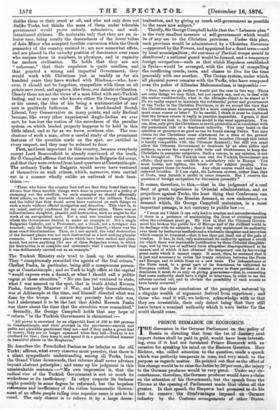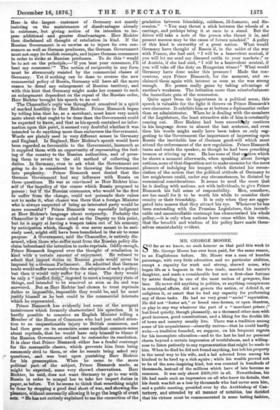PRINCE BISMARCK ON ECONOMICS.
rpHE discussion in the German Parliament on the policy of 1 Russia in directing that from the 1st of January next import duties shall be paid in gold, would have been interest- ing, even if it had not furnished Prince Bismarck with an occasion for speaking his mind on the Eastern Question. Herr Richter, who called attention to the question, made a speech which was perfectly temperate in tone, and very much to the purpose as regards matter. He pointed out that as the effect of this change would be to raise the duties by 30 per cent., the injury to the German producer would be very great. Under any cir- cumstances, therefore, the German producer would have a claim on the attention of his Government, but the speech from the Throne at the opening of Parliament made that claim all the greater. In that speech the Emperor had promised to do his best to remove the disadvantages imposed on German industry by the Customs arrangements of other States. Here is the largest customer of Germany not merely insisting on the maintenance of disadvantages already in existence, but giving notice of its intention to im- pose additional and greater disadvantages. Herr Richter then disclaimed all thought of retaliation .in kind. If the Russian Government is so unwise as to injure its own con- sumers as well as German producers, the German Government must not copy its foolish example, and injure German consumers in order to strike at Russian producers. To do this "would be to act on the principle —'If you beat your consumer, I'll beat my consumer.'" The notion of reciprocity in any form must be strenuously resisted by the commercial classes of Germany. Yet if nothing can be done to reverse the new commercial policy of Russia, Germany will have all the more reason to dread any enlargement of Russian territory, and with this hint that Germany might make her consent to such an enlargement dependent on the repeal of the Russian order, Herr Richter brought his speech to an end.
The Chancellor's reply -was throughout conceived in a spirit of marked hostility to Herr Richter. Prince Bismarck began by telling him that he, as a merchant, must know very much more about what ought to be done than the Government could be expected to know, and that as his speech contained no infor- mation upon this point, it seemed very doubtful whether it was intended to-do anything more than embarrass the Government. Words are plainly used in very different senses in Germany and England. In England, Herr Richter's speech would have been regarded as favourable to the Government, inasmuch as it supplied them with an opportunity of representing the feel- ing of the country to the Russian authorities, and of press- ing them to revert to the old method of collecting the duties. In Germany, even to ask what the Government are going to do is considered to be throwing the Government into perplexity. Prince Bismarck next denied that the German Government had any influence with Russia on these questions. He was as convinced as Herr Richter him- self of the impolicy of the course which Russia proposed to pursue ; but if the Russian consumers, who would be the first to suffer from the change, could not persuade their rulers not to make it, what chance was there that a foreign Minister who is always suspected of being an interested party would be more successful? Prince Bismarck was especially indignant at Herr Richter's language about reciprocity. Probably the Chancellor is of the same mind as the Deputy on this point, but he is angry at having a weapon taken out of his armoury by anticipation which, though it was never meant to be seri- ously used, might still have been brandished in the air to some purpose. A Government, said the Chancellor, is entirely dis- armed, when those who suffer most from the Russian policy dis- claim beforehand the intention to make reprisals. Oddlyenough, Prince Bismarck lingered over the thought of retaliation in kind with a certain amount of enjoyment. He refused to admit that import duties on Russian goods would never be imposed by a German Parliament. He admitted that German trade would suffer materially from the adoption of such a policy, but then it viotdd only suffer for a time. The duty would be only a " conffictAnfly,,°„ imposed to meet a temporary state of things, and intended to be removed as soon as its end was answered. But as Hen. Richter had chosen to treat reprisals duties as impossible, impossible they would be, and he must justify himself as he best could to the commercial interests which he represented.
Prince Bismarck has evidently lost none of the arrogant incisiveness which formerly characterised his speeches. It is hardly possible to conceive an English Minister telling a Member of the House of Commons who had just called atten- tion to an unquestionable injury to British commerce, and had then gone on -to enunciate some excellent common-sense about reprisals, that he would have only himself to blame if the Russian Government refused to reconsider its resolution. It is clear that Prince Bismarck either has a feudal contempt for the mercantile classes, which prevents him from being commonly civil to them, or else he resents being asked any questions, and was bent upon punishing Herr Richter for his presumption. When he came to the more political part of the subject, Prince Bismarck made, as might be expected, some very shrewd observations. Herr Richter, he said, does not want Germany to go to war with Russia in order to compel her to take her import duties in paper, as before. Yet he seems to think that something might be done by stopping a good deal short of war, and showing dis- pleasure, without necessarily allowing it to go the length of overt act.. "He has not entirely explained to me the connection of the gradation between friendship, coldness, ill-humour, and dis- sension." "You may thrust a stick between the wheels of a carriage, and perhaps bring it at once to a stand. But the driver will take a note of the person who thrust it in, and present success may be the cause of future mischief." A policy of this kind is unworthy of a great nation. What would Germany have thought of Russia if, in the midst of the war with France, she had said, "I will be a benevolent neutral, if you will let me send my diseased cattle to your markets ;" or of Austria, if she had said, "I will be a benevolent neutral, if you will take off the duty on Hungarian wines?" What would Germany have done under this pressure I Made the con- cessions, says Prince Bismarck, for the moment, and re- claimed them again with interest as soon as she was strong enough. No person really gains by taking advantage of another's weakness. The irritation more than counterbalances the immediate gain of the concession.
Quite apart from its importance in a political sense, this speech is valuable for the light it throws on Prince Bismarck's own character. It exhibits him as at bottom a diplomatist rather than an administrator. When he is dealing with the members of the Legislature, the least attractive side of him is constantly coming out. Herr Richter had been exceediftly cautious in his language down to almost the last sentence, and even then his words might easily have been taken as „only sug- gesting to the Government the importance of impressing upon Russia the inevitable loss of .German good-will which must attend the enforcement of the new regulation. Prince Bismarck turns and rends the speaker, as though he had been preaching treason or stirring up war. He has none of that ciption which he shows a moment afterwards, when speaking about foreign nations, none of that disposition not to make enemies for the mere pleasure of indulging his temper, which dictated his renun- ciation of the notion that the political attitude of Germany to her neighbours could, under any circumstances, be dictated by economical considerations. It seems to need the sense that he is dealing with nations, not with individuals, to give Prince Bismarck his full sense of responsibility. Men, somehow, are too small for it to be worth his while to consider their enmity or their friendship. It is only when they are aggre- gated into masses that they attract his eye. Whenever he has been contending with the Prussian Legislature, this ineradi- cable and uncontrollable contempt has characterised his whole policy,—it is only when nations have come within his vision, that the breadth and wisdom of his policy have made them- selves unmistakably evident.



































 Previous page
Previous page